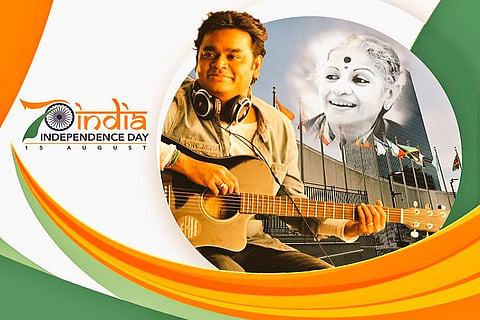

India and the United Nations (UN) turn 70 this year. To address the collective conscience of 7.4 billion people, the world’s largest democracy will mark its Independence Day, August 15, in a unique way – with sublime music and visionary ideas, completed with a spirited call. With a billion-plus people, India is, “… ready to play its part in shaping the rules on global platforms such as the UN,” India’s Ambassador to the UN, Syed Akbaruddin, told TNM’s Chitra Subramaniam in an exclusive email interview. Here are excerpts from the interview:
MS Subbulakshmi sang “Maithreem Bhajata” at the UN in 1966. It speaks to ending wars, environmental protection, the role and importance of women in the world and compassion among other key issues. Is India sending a strong message to a war-torn world?
India’s cultural traditions are inherently inclusive. Whether we talk of Vasudaiva kutumbakam – the world is one family – or Atmavat Eva Paraan api pashyata – look upon others as similar to yourself. The approach is of leaving no one behind. A thinking that underpins the Sustainable Development Goals adopted by the UN at the current 70th session. The UN is celebrating its 70th anniversary. As we celebrate India’s 70th Independence Day, our effort is to emphasise that the wisdom of our traditions remains relevant to current global thinking.
It was a special composition for the event by Jagadguru Shankaracharya. How many countries were talking about these issues at the UN 50 years ago?
True, the composition was reflective of a tradition of peace; a belief in renunciation of aggression; a desire for promotion of restraint; a yearning for sustainable livelihood and a striving for prosperity for all.
These are all eternal values that are global in nature. However, we need to be reminded about their validity from time to time, as we tend to forget our essence in the quest for the ephemeral. In diplomacy, we need to always bear in mind the broader purpose we work for even while we focus on the now. The beauty of the rendition was to capture in verse the essence of our humanity.
It is quite a coup you have achieved, to have AR Rahman pay tribute to MS at the UN on India’s 70th Independence Day. How did this idea come about?
The germination of an idea such as this is the outcome of efforts involving numerous people who have worked quietly but diligently over the past 6 months.
We are especially grateful to Sankara Nethralaya for partnering with us in this effort. The role of civil society is a growing one at the United Nations. It is thanks to the efforts of many from civil society that contemporary India’s most well-known music maestro AR Rahman will pay tribute to MS on a global platform as we celebrate our national day. That he has made time for this event is a tribute to his humility and reverence for the legend that MS remains. Her renditions continue to be listened to in millions of Indian households every day. This event pays homage to that living tradition of music in India.
The P-5 (US, UK, France, Russia) comprises countries that ‘won’ the Second World War as well as China. Is there a subtle yet very spirited message in the event for a re-structuring of the UN system as many countries are calling for?
The current global order is in the throes of change. Institutions that were crafted in a different era are being challenged to retain their relevance. No change of the international system can be complete without making the UN’s Security Council fit for purpose to meet the needs of the 21st century. The choice for the UN System is to adapt to current realities or to risk losing their relevance. As a strong votary of multilateralism, India is committed to the reform of the UN system in all its aspects.
Will the event also frame India’s call for expanding the P5 to reflect today’s reality and grant New Delhi a permanent seat?
Re-emerging India’s quest for its rightful place in the international order is an ongoing effort. The UN charter was framed in the name of “we the peoples”. Music is an integral part of our celebrations. The event signals that a country with a billion-plus people and a tradition of development in harmony with others is ready to play its part in shaping the rules on global platforms such as the UN.
What are some of the other events on the day?
Our effort is to celebrate such occasions in a befitting manner. While we cannot, at the UN, recreate the colour and gaiety that marks our Independence Day in India, our intention is to provide a glimpse of the dynamism of a nation on the move at the musical evening. We expect the gala musical event at the UN General Assembly Hall featuring AR Rahman to celebrate India’s 70th Independence Day will attract a full house. It is the centre-piece of our activities. Just prior to that a photo exhibition depicting various facets of MS Subbulakshmi’s career will be inaugurated at the UN and will remain open till 19th August. Also the UN Postal Administration is issuing a stamp on MS Subbulakshmi.
Since the appeal of India to all senses and sensibilities cannot be captured only at a musical event, we have also shared with our colleagues at the UN publications that celebrate the diversity that marks India.